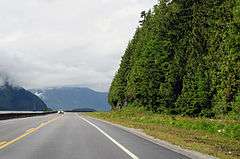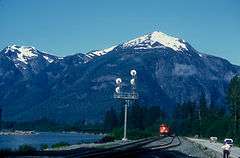British Columbia Highway 16
| ||||
|---|---|---|---|---|
 | ||||
| Route information | ||||
| Length: | 1,347 km (837 mi) | |||
| Existed: | 1953 – present | |||
| Western segment Haida Gwaii Highway | ||||
| Length: | 101 km (63 mi) | |||
| North end: | Masset | |||
| South end: | BC Ferries dock in Skidegate | |||
| Eastern segment Yellowhead Trans-Canada Highway | ||||
| Length: | 1,246 km (774 mi) | |||
| West end: | BC Ferries dock in Prince Rupert | |||
| Major junctions: |
| |||
| East end: |
Alberta border continues as | |||
| Highway system | ||||
|
British Columbia provincial highways
| ||||
Highway 16 is the British Columbia, Canada, section of the Yellowhead Highway. The highway closely follows the path of the northern B.C. alignment of the Canadian National Railway. The number "16" was first given to the highway in 1942, and originally, the route that the highway took was more to the north of today's highway, and it was not as long as it is now. Highway 16 originally ran from New Hazelton east to an obscure location known as Aleza Lake. In 1947, Highway 16's western end was moved from New Hazelton to the coastal city of Prince Rupert, and in 1953, the highway was extended east to Prince George. In 1969, further alignment east into Yellowhead Pass was opened to traffic after being constructed up through 1968 and raised to all-weather standards in 1969. Highway 16's alignment on the Haida Gwaii was commissioned in 1984, with BC Ferries beginning service along Highway 16 to the Haida Gwaii the following year.
A series of murders and disappearances has given the stretch between Prince Rupert and Prince George the name Highway of Tears.
Haida Gwaii Highway
The 1,347 km (837 mi)-long B.C. segment of Highway 16 begins in the west in the village of Masset, on the northern coast of Graham Island. Proceeding south, the highway goes 38 km (24 mi) to the inlet town of Port Clements. Winding its way along the boundary of Naikoon Provincial Park, Highway 16 goes south for 27 km (17 mi) before reaching the community of Tlell. 36 km (22 mi) south of Tlell, Highway 16 reaches Skidegate, where its Haida Gwaii section terminates.
Yellowhead Trans-Canada Highway
BC Ferries then takes Highway 16 across the Hecate Strait for 172 km (107 mi) due northeast to its landing at Prince Rupert.

From Prince Rupert, Highway 16 begins its winding route east through the Coast Mountain Ranges. Following the Skeena River, the highway travels for 151 km (94 mi) to the city of Terrace. Highway 37 merges onto Highway 16 in Terrace, and the two highways share a common alignment for 91 km (57 mi) northeast to the Kitwanga junction, where Highway 37 diverges north. Another 43 km (27 mi) northeast, Highway 16 reaches New Hazelton, where it then veers southeast along the Bulkley River. 68 km (42 mi) later, the highway reaches the town of Smithers, proceeding southeast another 64 km (40 mi) to the village of Houston.

At Houston, Highway 16 begins a parallel course along the little Bulkley River, proceeding 81 km (50 mi) east to its junction with Highway 35 at Burns Lake. 128 km (80 mi) east, after passing through the hamlet of Fraser Lake, Highway 16 reaches its junction with Highway 27 in the town of Vanderhoof. 97 km (60 mi) east of Vanderhoof, Highway 16 reaches its B.C. midpoint as it enters the city of Prince George at its junction with Highway 97. Highway 16 leaves Prince George after coursing through the city for 9 km (6 mi) .
_while_passing_through_Mt._Robson_Provincial_Park.jpg)
120 km (75 mi) east of Prince George, Highway 16 reaches the community of Dome Creek, where it converges with the Fraser River and turns southeast. It follows the Fraser River upstream for 82 km (51 mi) to McBride, then continues upstream for another 64 km (40 mi) to its junction with Highway 5 at Tête Jaune Cache. 14 km (9 mi) east of Tête Jaune Cache, Highway 16 enters Mount Robson Provincial Park, coursing through the park for 63 km (39 mi) to the boundary between British Columbia and Alberta within Yellowhead Pass.
The Highway of Tears
The Highway of Tears is a stretch of Highway 16 between Prince George and Prince Rupert.[1] Since 1969, numerous women have gone missing along the 720 km section of highway.[2] RCMP list the number of missing or murdered women at eighteen but aboriginal organizations speculate that number ranges into the forties.[3] Thirteen out of the eighteen recorded victims were teenagers while ten out of the eighteen were of aboriginal descent.[4] In 2006, RCMP launced Project E-PANA; a special investigation unit that focused on the Highway of Tears disappearances and murders.[5] The unit was originally given nine cases in 2006 which the doubled to eighteen cases in 2007.[6] Due to budget cutbacks in the past few years, E-PANA's officers and budget have been dramatically cut; significantly hampering investigations into the Highway of Tears.[7]
References
- ↑ Gerson, Jen. "Four things to know about Highway of Tears scandal, and the documents B.C. government allegedly deleted". National Post. Retrieved 8 December 2015.
- ↑ Ferreras, Jesse. "Highway Of Tears: BC's Missing And Murdered Women". Huffington Post. Retrieved 8 December 2015.
- ↑ "Those Who Take Us Away" (PDF). Human Rights Watch. Retrieved 8 December 2015.
- ↑ CULBERT, LORI. "Police budget, officers cut in Highway of Tears probe Read more: http://www.vancouversun.com/news/Police+budget+officers+Highway+Tears+probe/10196415/story.html#ixzz3tksyrgQX". Vancouver Sun. Retrieved 8 December 2015. External link in
|title=(help) - ↑ "Project E-PANA". BC RCMP.
- ↑ "Project E-PANA". BC RCMP.
- ↑ "Vancouver Sun". Police budget, officers cut in Highway of Tears probe Read more: http://www.vancouversun.com/news/Police+budget+officers+Highway+Tears+probe/10196415/story.html#ixzz3tl1jPSSg. Retrieved 8 December 2015. External link in
|website=(help)
External links
| Wikimedia Commons has media related to British Columbia Highway 16. |
| ||||||||||||||||||||||||||||||||||
| |||||||||||||||||||||||||||||||||||||||||||||||||||||
.svg.png)
